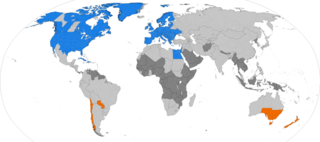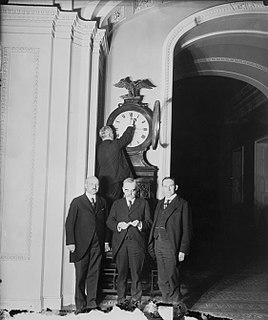Related Research Articles

Daylight saving time (DST), also daylight savings time or daylight time, also summer time, is the practice of advancing clocks during summer months so that evening daylight lasts longer, while sacrificing normal sunrise times. Typically, regions that use daylight saving time adjust clocks forward one hour close to the start of spring and adjust them backward in the autumn to standard time. In effect, DST causes a lost hour of sleep in the spring and an extra hour of sleep in the fall.

Japan Standard Time or JST is the standard timezone in Japan, 9 hours ahead of UTC. There is no daylight saving time, though its introduction has been debated several times. During World War II, it was often called Tokyo Standard Time.

The Eastern Time Zone (ET) is a time zone encompassing part or all of 22 states in the eastern part of the contiguous United States, parts of eastern Canada, the state of Quintana Roo in Mexico, Panama in Central America, and the Caribbean Islands.

The Pacific Time Zone (PT) is a time zone encompassing parts of western Canada, the western United States, and western Mexico. Places in this zone observe standard time by subtracting eight hours from Coordinated Universal Time (UTC−08:00). During daylight saving time, a time offset of UTC−07:00 is used.
This is a timeline of Australian history, comprising important legal and territorial changes and political events in Australia and its predecessor states. To read about the background to these events, see History of Australia. See also the list of Prime Ministers of Australia.

Time in New Zealand, by law, is divided into two standard time zones. The main islands use New Zealand Standard Time (NZST), 12 hours in advance of Coordinated Universal Time (UTC) / military M (Mike), while the outlying Chatham Islands use Chatham Standard Time (CHAST), 12 hours 45 minutes in advance of UTC / military M^ (Mike-Three).

The Atlantic Time Zone is a geographical region that keeps standard time—called Atlantic Standard Time (AST)—by subtracting four hours from Coordinated Universal Time (UTC), resulting in UTC−04:00. During part of the year, some portions of the zone observe daylight saving time, referred to as Atlantic Daylight Time (ADT), by moving their clocks forward one hour to result in UTC−03:00. The clock time in this zone is based on the mean solar time of the 60th meridian west of the Greenwich Observatory.

Australia uses three main time zones: Australian Western Standard Time, Australian Central Standard Time, and Australian Eastern Standard Time. Time is regulated by the individual state governments, some of which observe daylight saving time (DST). Australia's external territories observe different time zones.
Nicholas Paul Enright AM was an Australian dramatist and playwright and theatre director.
Egypt Standard Time is UTC+2, which is exactly the same as Eastern European Time, and is co-linear with neighboring Libya and Sudan. Egypt has previously used Eastern European Summer Time (UTC+3), during the summer periods from 1957–2010 and 2014–15.

Surf Life Saving Australia (SLSA) is an Australian not-for-profit community organisation that promotes water safety and provides surf rescue services.

Mexico uses four main time zones since February 2015. Most of the country observes Daylight Saving Time.
- Zona Sureste covers the state of Quintana Roo is UTC-05:00 year round. It is the equivalent of U.S. Eastern Standard Time.
- Zona Centro covers the eastern three-fourths of Mexico, including Mexico City, Guadalajara and Monterrey. For most of the year, it is the equivalent of U.S. Central Time.
- Zona Pacífico covers the states of Baja California Sur, Chihuahua, Nayarit, Sinaloa, and Sonora. The state of Sonora, like the U.S. state of Arizona, does not observe daylight saving time. For most of the year, it is the equivalent of U.S. Mountain Time.
- Zona Noroeste covers the state of Baja California. It is identical to U.S. Pacific Time, including the daylight saving time schedule.

Daylight saving time in the United States is the practice of setting the clock forward by one hour during the warmer part of the year, so that evenings have more daylight and mornings have less. Most areas of the United States observe daylight saving time (DST), the exceptions being Arizona, Hawaii, and the overseas territories of American Samoa, Guam, the Northern Mariana Islands, Puerto Rico, and the United States Virgin Islands. The Uniform Time Act of 1966 established the system of uniform Daylight Saving Time throughout the US.
This article details scores and results from the 2008 NRL Under-20s season.
The 2009 Western Australian daylight saving referendum was held on 16 May 2009 in the Australian state of Western Australia to decide if daylight saving time should be adopted. It was the fourth such proposal which had been put to Western Australian voters and followed a three-year trial period. The referendum resulted in the proposal being rejected, with 54.56% voting against the proposal.
Gabriel Andrews is an Australian television, film and stage actor. He is best known for the hundreds of roles he played on the popular sketch comedy TV show Comedy Inc.

The choice of whether to use daylight saving time (DST) in Australia is a matter for the individual states and territories. However, during World War I and World War II all states and territories had daylight saving. In 1968 Tasmania became the first state since the war to practise daylight saving. In 1971, New South Wales, Victoria, Queensland, South Australia, and the Australian Capital Territory followed Tasmania by observing daylight saving. Western Australia and the Northern Territory did not. Queensland abandoned daylight saving time in 1972. Queensland and Western Australia have observed daylight saving over the past 40 years from time to time on trial bases.

Most areas in North America and Europe, and some areas in the Middle East, observe daylight saving time (DST), while most areas of Africa and Asia do not. In South America, most countries in the north of the continent near the equator do not observe DST, while Paraguay and southern parts of Brazil do. The practice of observing daylight saving time in Oceania is also mixed, with New Zealand and parts of southeastern Australia observing DST, while most other areas do not.

The Riverina Express was a passenger train operated by the New South Wales Government Railways between Sydney, Griffith and Albury from September 1949 until November 1993.
The AWGIE Award for Stage is awarded by the Australian Writers' Guild at the annual AWGIE Awards for Australian performance writing. The award is for the playscript. To be eligible, the play must have had its first professional production in the previous year.
References
- ↑ David Marr, "Adored member of stage's family", Sydney Morning Herald, 2 April 2003, accessed 6 March 2013